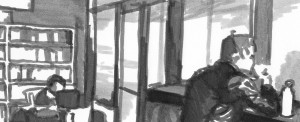
When Dave Duda first opened the Book Trader Café and bookstore twelve years ago, he stood behind the counter and announced, “This is it. I’m closing the book here. This is where I’m going to spend the rest of my life.” At the time, the store was one of four used bookstores in New Haven, each vying for Yale business. Today, it is the only one that remains.
My mother owns an independent bookstore and I’ve been browsing through books my whole life. And yet I am one of many students who resort to finding books online. With hyperlinks, pics, video clips, and, of course, cheaper prices, it is increasingly enticing to opt for accessible digital resources. But the sad truth is, as more and more people exchange the printed page for the electronic screen, more and more independent bookstores face financial decline.
But at 12:30 on a Friday, Book Trader is packed. A quick glance into the glass paned, greenhouse-like sitting area reveals no empty chairs. The line to the café counter at the back of the store is long, and the front door doesn’t stay shut for more than a minute. Through the brick archway to the left of the entrance, there is little room to navigate between the high shelves, as people stand flipping through an array of books about art, architecture, poetry, drama, philosophy, and religion.
Duda’s career in used books began when he walked into a used bookstore on a job hunt after college and was hired on the spot. At first, the job seemed like a waste of time, but in retrospect, Duda recognizes that it served as his apprenticeship: he developed the instincts for knowing what to buy and what to write on the price sticker.
Of the thousands of used books that sellers offer him weekly, Duda has to pick and choose which ones he wants to buy. “Some people think if you’ve got a one hundred year old book it’s worth something,” he explains. “Most of the time it isn’t.” He calls this one of the most basic problems facing the printed page today. As more and more people want to sell their books and make a quick dollar, the market is flooded with used books, a phenomenon which drives down the price. Since his beginnings, Duda has seen the price of a used book fall from $10.95 to $4.95. “I wish anybody luck opening a new bookstore these days,” he says. “There’s so much more media competing with the printed page.”
Many independent bookstores, including my mother’s, have responded to this price decrease by supplementing their literary stock with toys, stationery goods, and other knick-knacks. The number of books in an average bookstore has slowly decreased, and those that remain are hidden from view by other products. The store survives financially, not as a bookstore—but as a toy store.
At Book Trader, sandwiches, soups, coffee and baked goods have, as of yet, kept the plush animals and artisan cards at bay. Duda acknowledges that the café portion of Book Trader provides much of the store’s revenue. When I tell friends that I’m writing about Book Trader, they’re more likely to bring up the Jane Rare, a delicious roast beef sandwich with horseradish mayo, or the amazing hot chocolate, than the books. The café’s success is what allows Duda to pay a little more for books and sell them for a little less. But the edible bounty takes nothing away from the literary stock.
Unlike owners of other independent bookstores, Duda remains committed to keeping it about the books: “We think we’ve created something kind of special that people appreciate. There’s a community of people that enjoy this establishment and what we’ve done. I don’t have too many desires about how to make it better.” The café brings in a lot of money, but the bookstore part of the business still draws in locals and out-of-towners alike, whether they want to buy books or, more often, spend an afternoon browsing.
A time may come when Google Books and the Kindle become our primary media for reading literature. But there is a hope that other independent bookstores will learn to supplement their literary stock with whatever products allow them to stay financially afloat.
Duda, for one, is committed to preserving Book Trader’s essence no matter the cost. As he acknowledges, “I could put in more café tables and make more money, but I don’t think we’d have as much fun.”

